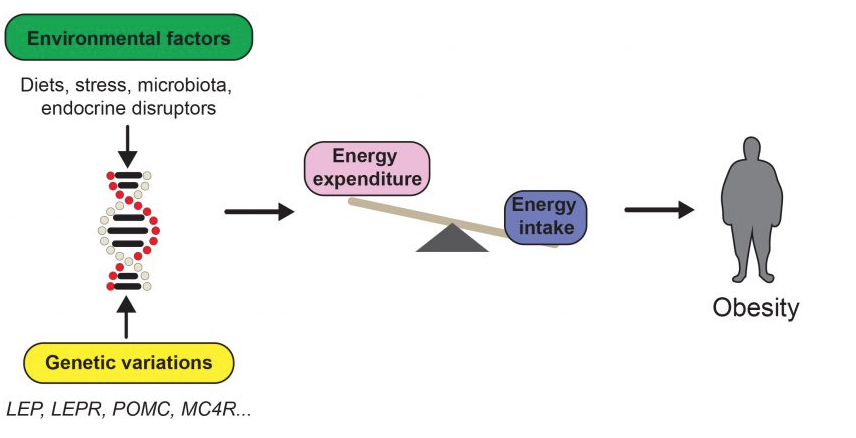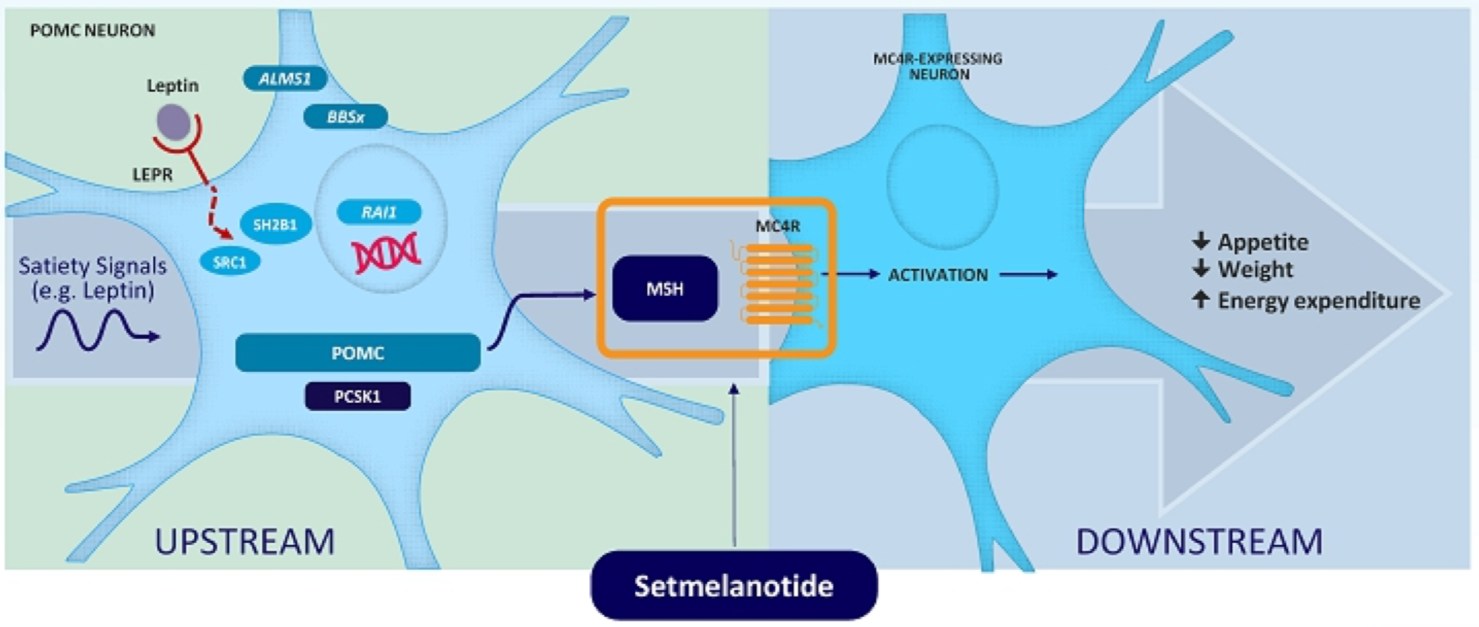Setmelanotide
Setmelanotide
The FDA approved Imcivree (setmelanotide) for chronic weight management in patients six years and older with obesity due to 3 genetic conditions: pro-opiomelanocortin (POMC) deficiency, proprotein subtilisin/kexin type 1 (PCSK1) deficiency, and leptin receptor (LEPR) deficiency. POMC, PCSK1 or LEPR deficiency affect the melanocortin 4 receptor (MC4R) pathway which is responsible for transmission of signals about when to eat and when to stop eating. Patients with these deficiencies continuously feel hungry and become severely obese. Setmelanotide, the active substance contained in Imcivree, works by activating a pathway in the brain that controls appetite and feeling full. This can help patients eat less and lose weight. It also increases the number of calories that you burn by increasing resting energy.

Hunger Signaling
Setmelanotide is a small peptide drug. It acts like a hormone and stimulates the melanocortin 4 receptor (MC4). The MC4 receptor is present in the hypothalamus and manages the body’s energy balance by processing energy-related metabolic signals. It is critical to appetite, glucose metabolism, energy homeostasis, blood pressure, heart rate and body-weight control.
When activated, the MC4 sends out commands that cause us to feel full. The cycle goes like this: When our energy levels drop the hypothalamus produces a hunger hormone (NYP or AGRP) that inactivates the MC4 receptor and we get hungry. After we eat, another hormone (α-MSH) binds to the active site on the MC4, replacing the hunger hormone and turning the receptor back on which tells our brain that we are full.
Problems occur with poor diet or possible mutations which inactivate the MC4 receptor, causing people to feel constantly hungry. This makes the MC4 a prime target for anti-obesity drugs, such as setmelanotide, that act as a master switch, switching on MC4 to control hunger. Treatment with setmelanotide could be another option for obese patients with diet induced obesity or defects in the leptin–melanocortin signaling pathway.
Problems with diet-induced obesity on melanocortin signaling
- High-fat diets can damage regions of the hypothalamus that regulate and control energy homeostasis.
- High-fat diets can induce hypothalamic injury with inflammation, gliosis and neuronal loss.
- Obesity induces activation of the immune system and inflammation, which impacts many organs including adipose tissue, pancreas, liver, skeletal muscle and the brain.
- Obesity induces activation of the immune system and inflammation, which impacts many organs including adipose tissue, pancreas, liver, skeletal muscle and the brain.
- In obesity, increased circulating saturated fatty acids and loss of HDL promotes hypothalamic inflammation and altered mitochondrial function in the hypothalamus.
- In obesity, inflammation-induced changes in the blood-brain-barrier may contribute to neuronal injury and decreased regeneration of neurons relevant to energy homeostasis.
- Diet induced obesity can disrupt mitochondrial function and suppress the nutrient-dependent excitability of POMC neurons.
- In obesity, disrupted insulin signaling by inflammation disrupts signaling in POMC neurons, thereby resulting in insulin and leptin resistance.
Obesity caused by diet or by POMC genetic deficiency shows disruption to the normal hypothalamic functions that control metabolic balance. Studies have shown that Setmelanotide given to obese individuals with leptin or insulin resistance causes decrease in hunger and increase in weight loss. Moreover, obese patients with POMC deficiency also have decrease of hunger and substantial weight loss when treated with Setmelanotide.

These studies suggest that, in addition to obesity due to POMC or leptin deficiency, Setmelanotide, alone or in combination with GLP-1 agonists, may also be beneficial for treatment of obesity and diabetes. Combination therapy of drugs acting on different pathways can offer synergistic effects on obesity treatment.
Benefits
- Can shift energy source to fat in obese individuals
- Can increases the number of calorie burn
- Can reduce hunger
- Can induce weight loss
- Can improve insulin and leptin sensitivity
- Can help regulate and control energy balance
Side Effects
- injection site reactions
- skin hyperpigmentation (tanning)
- nausea
- headache
- diarrhea
- abdominal pain
- back pain
- fatigue
- vomiting
- depression
- upper respiratory tract infection
- spontaneous penile erection
How Peak Vitality can help?
Peak Vitality offers consultations for anyone looking into their medical weight loss options. In the consultations, we work together to develop a medical weight loss plan that is safe and effective for you. Schedule your consultation today!
All patients always work directly with one of our physicians to ensure patient safety and confidentiality.
